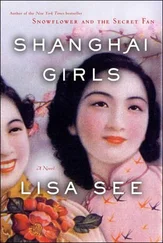Lisa See - Peony in Love
Здесь есть возможность читать онлайн «Lisa See - Peony in Love» весь текст электронной книги совершенно бесплатно (целиком полную версию без сокращений). В некоторых случаях можно слушать аудио, скачать через торрент в формате fb2 и присутствует краткое содержание. Жанр: Старинная литература, на английском языке. Описание произведения, (предисловие) а так же отзывы посетителей доступны на портале библиотеки ЛибКат.
- Название:Peony in Love
- Автор:
- Жанр:
- Год:неизвестен
- ISBN:нет данных
- Рейтинг книги:4 / 5. Голосов: 1
-
Избранное:Добавить в избранное
- Отзывы:
-
Ваша оценка:
- 80
- 1
- 2
- 3
- 4
- 5
Peony in Love: краткое содержание, описание и аннотация
Предлагаем к чтению аннотацию, описание, краткое содержание или предисловие (зависит от того, что написал сам автор книги «Peony in Love»). Если вы не нашли необходимую информацию о книге — напишите в комментариях, мы постараемся отыскать её.
Peony in Love — читать онлайн бесплатно полную книгу (весь текст) целиком
Ниже представлен текст книги, разбитый по страницам. Система сохранения места последней прочитанной страницы, позволяет с удобством читать онлайн бесплатно книгу «Peony in Love», без необходимости каждый раз заново искать на чём Вы остановились. Поставьте закладку, и сможете в любой момент перейти на страницу, на которой закончили чтение.
Интервал:
Закладка:
Some might say all this is too ridiculous. Some might say it could never have happened this way. Some might say this was in my imagination—a fevered imagination that would eventually lead to my obsessed writings and no-good end. Some might even say, if everything happened the way I’ve recounted, that I deserved my no-good end and had earned worse than death, which in truth is what I got. But at the time I was joyous.
“I think we were destined to meet,” he said. “I didn’t know you would be here last night, but you were. We can’t fight fate. Instead, we must accept that fate has given us a special opportunity.”
I blushed deeply and looked away.
All the while, the opera played in our garden. I knew it so well that even though I was distracted by what was happening with my stranger, a ( 3 7 )
part of me was letting the story seep into my consciousness. Now at last I heard Liniang admit who she was: a spectral image locked between life and the afterworld. Mengmei’s terrified screams echoed through the Riding-the-Wind Pavilion. I shivered again.
My young man cleared his throat. “I think you know this opera very well.”
“I’m just a girl and my thoughts are of no importance,” I answered, trying to be modest, which was foolish given our circumstances.
He looked at me quizzically. “You are beautiful, which pleases me, but it is what is inside here”—without touching me, he reached out and brought the tip of his finger to a spot over my heart, the seat of all consciousness—“that I’d like to know.”
The place on my chest where he’d almost touched me burned. We were both bold and reckless, but where Liniang’s enticing words and her scholar’s equally suggestive actions eventually ended in consummation, I was a living girl who could never give herself away so easily without paying a severe price.
In the garden, Mengmei overcame his fear of the ghost, proclaimed his love, and agreed to marry Liniang. He painted the dot on Liniang’s ancestor tablet, something her father had been too hurried with his promotion to do. Mengmei opened the grave and removed the jade funeral stone that had been placed in Liniang’s mouth. With that, her body once again breathed the air of the living.
“I must go,” I said.
“Will you meet me again tomorrow?”
“I can’t,” I said. “They’ll miss me.”
I considered it a miracle that no one had come after me on either night.
How could I take one more chance?
“Tomorrow, but not here,” he went on as though I hadn’t just refused him. “Is there another place? Perhaps somewhere farther from the garden?”
“Our Moon-Viewing Pavilion is by the shore.” I knew where it was, but I’d never been there. I wasn’t even allowed to go there with my father.
“It is the farthest from the halls and the garden.”
“Then I will wait for you there.”
I longed for him to touch me, but I was afraid.
“You will come to me,” he said.
It took great willpower for me to turn away and head back to the opera.
( 3 8 )
I was fully aware of his eyes on me as I crossed back and forth across the zigzag bridge.
No girl—not even the spoiled Tan Ze—could meet her future husband like this, let alone a strange man, of her own volition, of her own choosing, with no watchful eyes, no condemnation. I had been carried away by the story of Liniang, but she was not a living girl who would suffer any consequences.
( 3 9 )

Spring Sickness in Summer
al l g i r l s th i nk about th e i r we dd i ng s. we worry that our husbands will be cold, mean, indifferent, or neglect-ful, but mostly we imagine something wonderful and joyous.
How can we not create a fantasy in our minds when the reality is so hard?
So, during the darkness as the nightingales sang, I imagined my wedding, my husband waiting for me in his home, and everything leading up to the moment we would be united—only, in place of a faceless man, I envisioned my handsome stranger.
I dreamed of the final bride-price gifts arriving. I imagined the sparkle and weight of the hairpins, earrings, rings, bracelets, and loose jewels. I thought of the Suzhou silks that would rival even what my father made in his factories. I dreamed of the last pig that would be part of the livestock my father would receive in exchange for me. I imagined the way my father would have the pig butchered and how I would wrap the head and tail to send back to the Wu family as a sign of respect. I thought of the gifts my father would send with the pieces of pig: sprigs of artemisia to expel evil influences before my arrival, pomegranates to symbolize my fertility, ju-jubes because the word sounded like having children quickly, and the seven grains, because the character for kernel was identical in writing and sound to offspring.
I dreamed of what the palanquin would look like when it came to fetch me. I thought about meeting my mother-in-law for the first time and how she would hand me the confidential wedding book that would instruct me ( 4 0 )
on what to do when the time came for clouds and rain. I imagined my first night alone in bed with my stranger. I conjured our future years together unhampered by worries about money or officialdom. We would enjoy the day, the night, a smile, a word, a kiss, a glance. All lovely thoughts. All pointless dreams.
When morning came—my birthday and the Double Seven Festival—I had no appetite. My mind was dense with memories of the young man’s breath against my cheek and his whispered words. This was, I realized with great happiness, lovesickness.
Today I wanted everything I did—from the moment I got up until I met him in the Moon-Viewing Pavilion—to be of my own choosing. I had Willow unwrap my bindings, letting her hold my right ankle in her palm and watching as her fingers unwound the cloth over, under, and around my foot in a hypnotic motion. She set my feet to soak in a bath of pomelo leaves, to keep my flesh soft and easy to bind, and then washed away the old skin. She used powder made from the root bark of the wolfberry to smooth away rough spots, sprinkled alum between my toes to ward off in-fection, and finished with a fine dusting of fragrant powder to entice.
My bound feet were extremely beautiful—my best feature—and I took great pride in them. Ordinarily I paid strict attention to Willow’s ministra-tions, making sure that my deep crease was fully cleaned, calluses cut away, any fragments of broken bone that poked through my skin sanded down, and my nails kept as short as possible. This time, I relished the sensitivity of my skin to the warmth of the water and the cool of the air. A woman’s feet were her greatest mystery and gift. If some miracle happened and I married my stranger, I would care for them in secret, powder-ing them to accentuate their odor, and then rewrapping them tightly so they would appear as small and delicate as possible.
I had Willow bring me a tray laden with several pairs of slippers. I gazed at them pensively. Which pair would he prefer, the magenta silk embroidered with butterflies or the pale green with the tiny dragonflies?
I looked at the silks Willow brought out for me and wondered if he might like them. Willow put me into my clothes, combed my hair, washed my face, and applied powder and rouge to my cheeks.
I was hopelessly lost in thoughts of love, but I still had to make offerings to my ancestors on Double Seven. I was not the first in my family to go to the ancestral hall this morning. We all wish for wealth, good harvests, and offspring, and already offerings of food had been made to encourage reciprocal gifts of fecundity from our ancestors. I saw whole taro ( 4 1 )
Читать дальшеИнтервал:
Закладка:
Похожие книги на «Peony in Love»
Представляем Вашему вниманию похожие книги на «Peony in Love» списком для выбора. Мы отобрали схожую по названию и смыслу литературу в надежде предоставить читателям больше вариантов отыскать новые, интересные, ещё непрочитанные произведения.
Обсуждение, отзывы о книге «Peony in Love» и просто собственные мнения читателей. Оставьте ваши комментарии, напишите, что Вы думаете о произведении, его смысле или главных героях. Укажите что конкретно понравилось, а что нет, и почему Вы так считаете.












